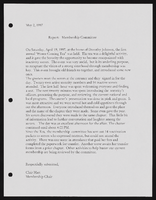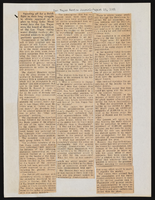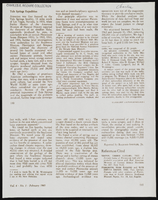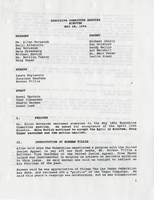Search the Special Collections and Archives Portal
Search Results

Alpha Kappa Alpha Sorority, Theta Theta Omega Chapter membership committee reports
Date
Archival Collection
Description
From the Alpha Kappa Alpha Sorority, Incorporated, Theta Theta Omega Chapter Records (MS-01014) -- Chapter records file.
Text
William Geagley Collection on Nuclear Safety
Identifier
Abstract
The William Geagley Collection on Nuclear Safety contains government publications, memoranda, and pamphlets about counteracting nuclear contamination of food supplies from 1951 to 1960. The materials primarily document Geagley’s oversight of the development of food safety contingency plans for the Michigan Department of Agriculture. The materials also contain information relating to the Nevada Test Site’s plans for Operation Plumbbob, atmospheric and underground nuclear tests held in 1957 in Nevada.
Archival Collection

Francisco Rufino Parra interview, December 6, 2018: transcript
Date
Archival Collection
Description
Interviewed by Barbara Tabach. Born in Mexico, Francisco was a child when his father received permission to immigrate to the US with his younger children. Upon graduating from high school in California, he moved to Las Vegas where one of his sisters lived. It was 1994 and jobs were plentiful; he would find his way through several positions. Then in early 2000 he was hired to be a dishwasher, on the graveyard, at the recently opened Paris Hotel. It was a Culinary Union job; by 2002 he was a shop steward and finding better positions at Paris. He continues to work at the Paris Hotel as a fry cook. In 2008, he was a citizen and proudly voted in his first presidential election.
Text

Ricardo Torres-Cortez interview, May 7, 2019: transcript
Date
Archival Collection
Description
Interviewed by Barbara Tabach. Monserrath Hernández and Maribel Estrada Calderón also participate in the questioning. Born in Mexico, came to live in Las Vegas in 1985. Graduate of UNLV in Journalism and a reporter of Public Safety for the Las Vegas Sun. Ricardo covered the 1 October shooting, the killing of two police officers and other traumatic news of the community.
Text

Transcript of interview with Marion Brooks by Kathleen Kasmir, February 24, 1975
Date
Archival Collection
Description
On February 24, 1975, Kathleen Kasmir interviewed Marion Brooks (born 1913 in Santa Ana, California) about his life in Southern Nevada and his work as a mining engineer. Brooks first talks about his background before talking extensively about his early work in mining. Brooks also mentions some of the professional mining societies of which he was a part, and the two then move on to discuss gambling, recreational activities, and the atomic testing. Other topics covered during the interview include the price of groceries and food, the El Rancho Vegas, social changes, population growth, and environmental changes. The end of the interview then shifts back to Brooks’ work in mining at Blue Diamond and then a discussion on the possible locations of three lost mines.
Text

Transcript of interview with Clark Crocker by Monica Lehman, March 3, 1978
Date
Archival Collection
Description
On March 3, 1978, Monica Lehman interviewed Clark Crocker (born 1920 in Westfield, Massachusetts) about his experiences while living in Nevada. Crocker first talks about his family and educational background before describing his experiences from going to school in both California and Massachusetts. Crocker then describes what he knows about the building of Hoover Dam and later talks about his career as a teacher and school principal. The two also discuss Crocker’s hobbies and volunteer work, including that for the fire department in Pahrump, and they later discuss Crocker’s experiences as both a frogman and navigator for the United States Navy during World War II. The interview concludes with some of Crocker’s thoughts and philosophies on how curriculum should be structured in schools.
Text




